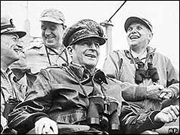 |
| General Douglas MacArthur devised the landing plans and was there to watch |
| 1950: UN stages daring assault on Inchon |
England have
The United Nations has landed up to 50,000 troops behind enemy lines at Inchon, on the west coast of Korea.
Inchon operates as a port for the South Korean capital, Seoul, and the offensive - the first major counter-strike of the war by the US-led allied forces and the South Koreans - is currently reported to be making good progress towards the city.
Seoul has been occupied by Communist North Korea since shortly after its troops invaded the south of the country without warning on 25 June this year.
The republican government fled its own capital in the face of the aggression, which was immediately condemned by the United Nations.
The United States, which believes the USSR to be behind the North Korean action, has since backed the South Koreans with troops and other military assistance.
Operation Chromite - as the current offensive is known - began at 0600 local time.
A massive fleet of 262 ships, including British, Canadian and Australian vessels, sailed to the coast off Inchon and landed an advance force of US Marines on Wolmi Island, connected to Inchon by a half-mile-long causeway.
They took the island within 30 minutes and carried on across the causeway to the Korean mainland.
The second wave of infantry was delayed by high tides, but landed at 1700 local time. Led by tanks, they pushed two miles inland under covering fire from aircraft which attacked North Korean shore batteries with rockets and bombs.
The allied landing forces were the largest assembled anywhere since World War II.
They were watched by their commander, General Douglas MacArthur, from the flagship of the supporting fleet.
After the initial landings, he signalled to the assault force, "The Navy and Marines have never shone more brightly than this morning."
In a later report to the Defence Department in Washington, he said casualties were light and the whole operation at Inchon was proceeding on schedule.
He also paid tribute to "the clockwork coordination and cooperation between the services involved."
The South Korean Commander-in-Chief, Major-General Chung Il Kwon, said the invading forces were putting pressure on the Communists near Kimpo airfield, a big air base to the north of Inchon.
There has been little resistance from the North Korean People's Army (NKPA), who are believed to have been taken completely by surprise by the attack.
|